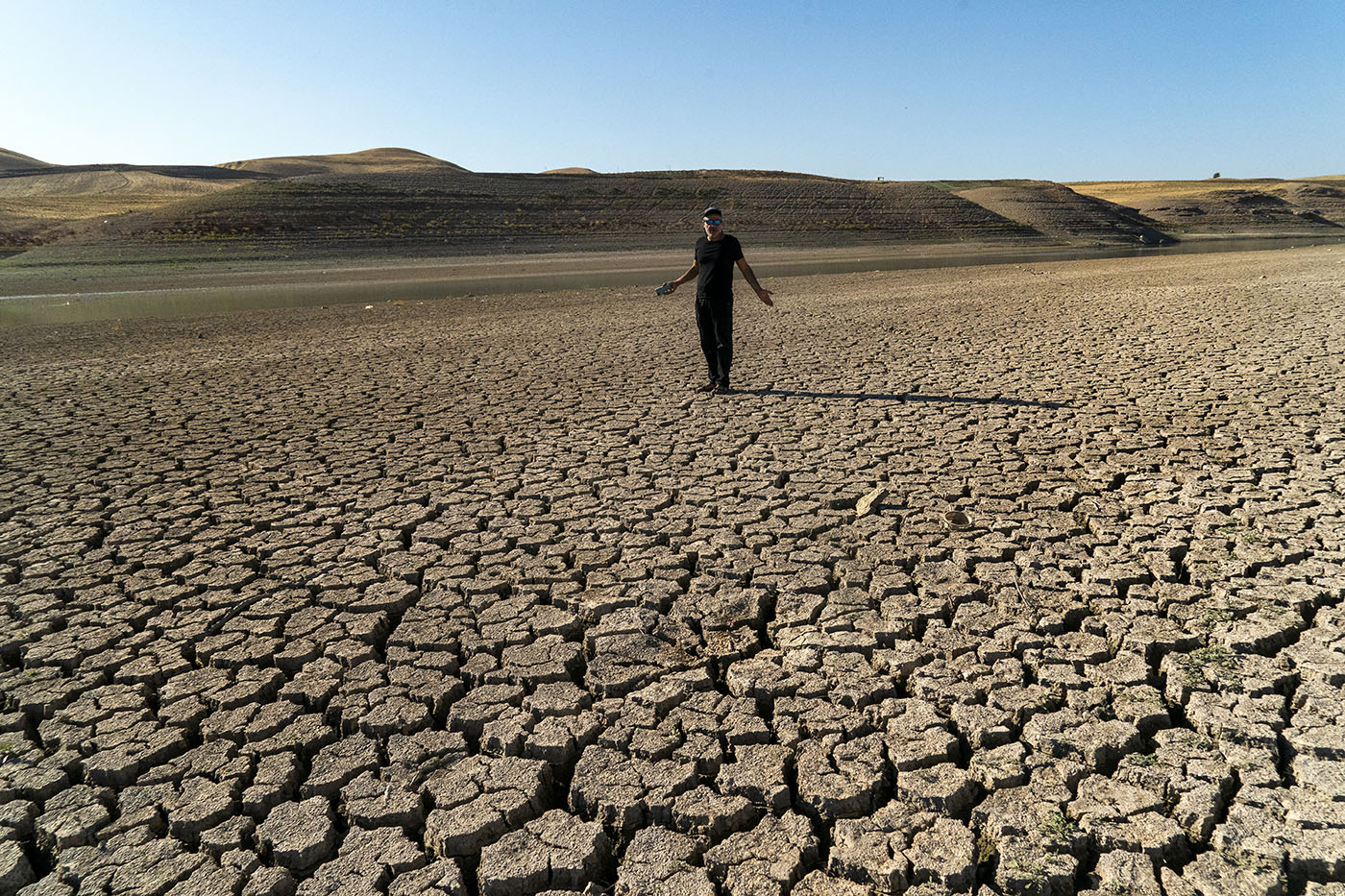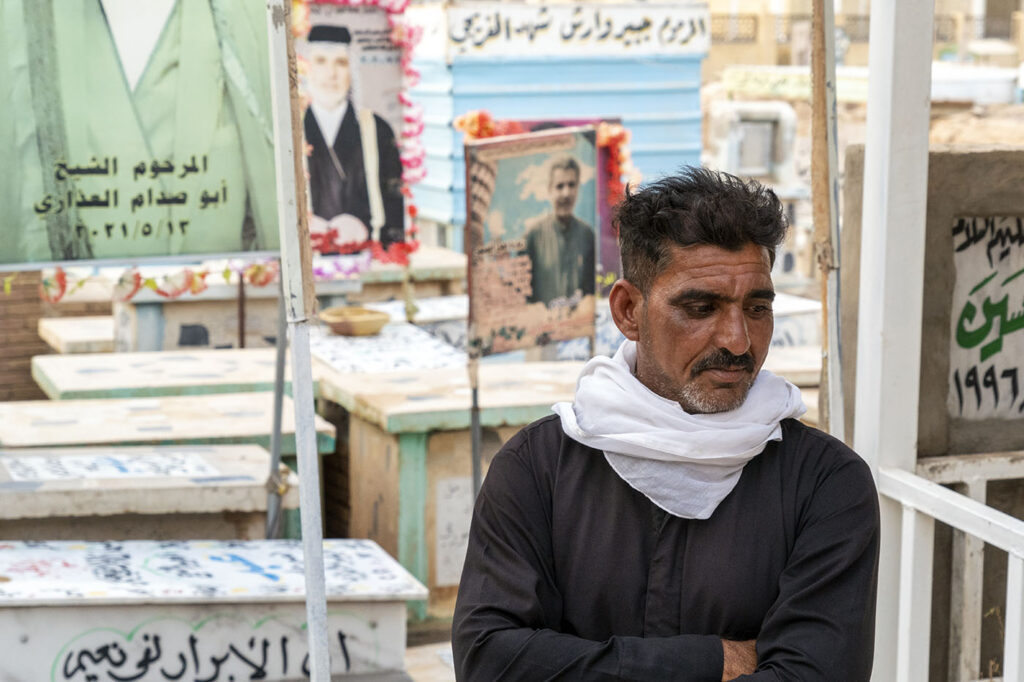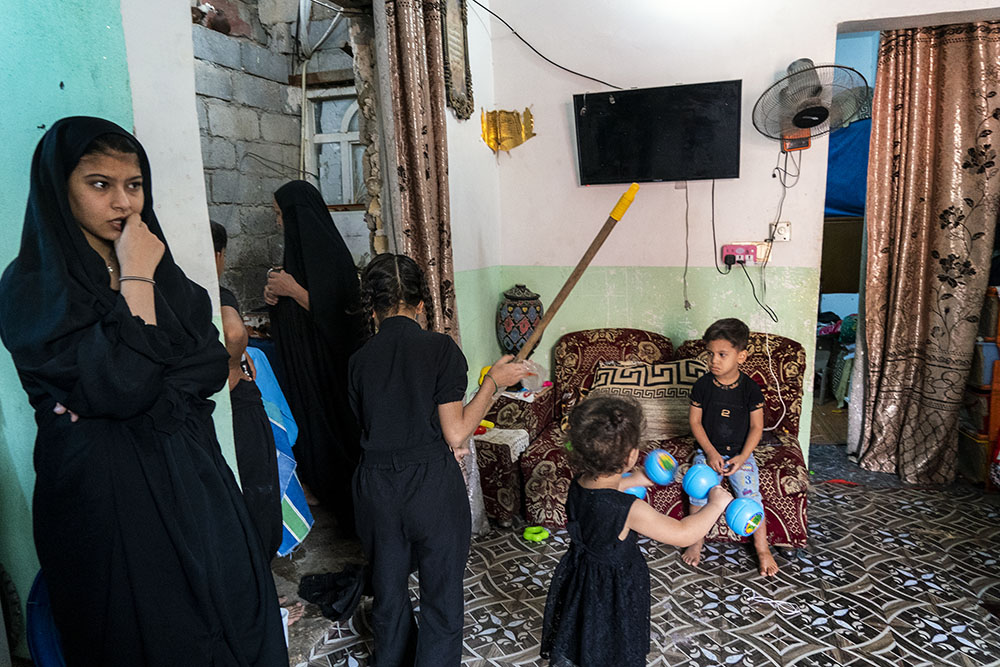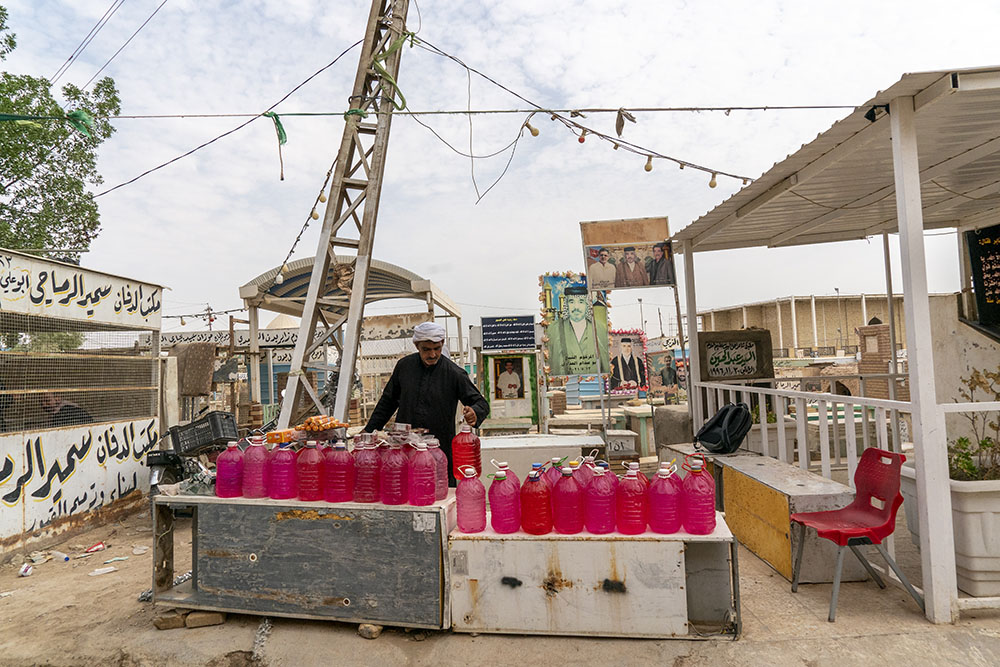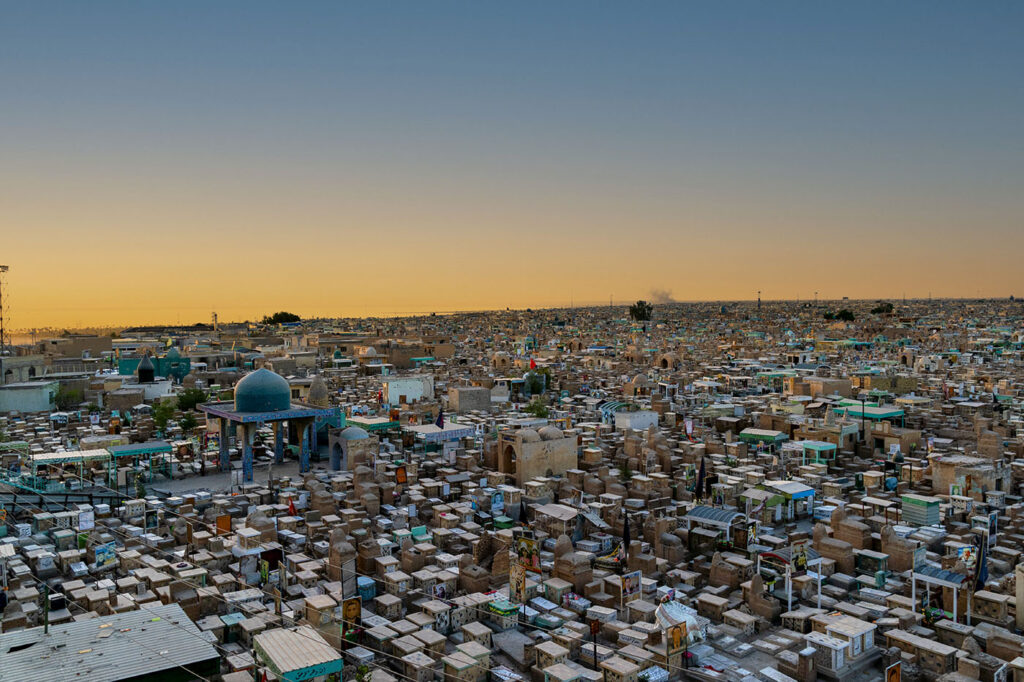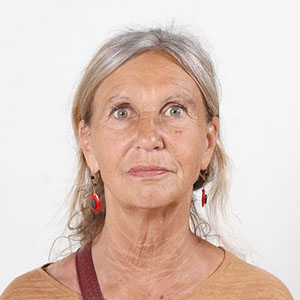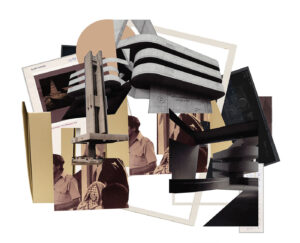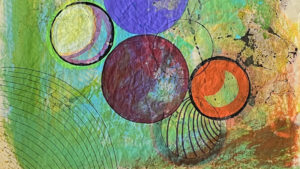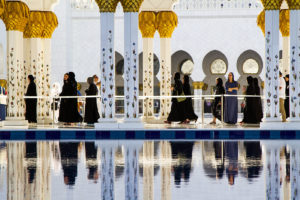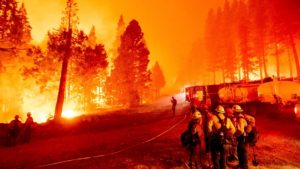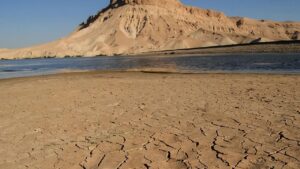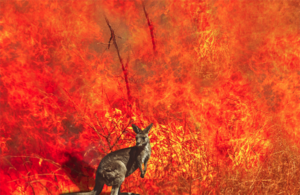In October 2021, I embarked on a journey from Iraq’s southernmost point, travelling with fixer Essam Al-Sudani and a translator, from the fishing community of Al-Faw at the Shatt Al-Arab estuary on the Persian Gulf up to the Iranian border in Kurdistan in the country’s north, exploring the impact of climate change and water scarcity along the way on those most directly affected. It was a route of despair, as people abandoned desiccated farms for lives on the edges of unwelcoming cities in Iraq – or beyond. It was a route of anger and suppurating rage – at Turkey and Iran, whose dams finished off the few farms climate change had not yet entirely defeated, and at a government unable to force the two countries to open the taps. It was a route of crisis, with Iraq expected to run out of useable water by 2025. In 2022, I returned to Iraq, this time to see what the new city lives the climate displaced farmers looked like. (This project was made possible with the support of the Pulitzer Center.)
Susan Schulman
“It was a beautiful life – like heaven. We owned the land, and it was a very rich land. We took care of our families and were very wealthy. I was like a king. Anything I wanted, anything we needed, it was there at our fingertips,” recalls Ali Sahib Hussein, 42, in an interview with The Markaz Review. He was speaking of the life his family lived for generations, farming their ancestral land in Al-Abbasiyyah, near the banks of the Euphrates in Iraq’s Al-Diwaniyyah governorate.
That was before the temperatures soared and the rainfall all but ceased; before water scarcity became so acute that snakes invaded homes in their own desperate search for water; before Iraq’s rivers fell to unprecedented levels, lakes dried up, crops shriveled, and the land turned to desert, forcing legions of farmers to abandon their beloved farms to seek new ways of making a living in the cities.
Now, Hussein spends his days sandwiched among tombs, selling incense and jugs of hot-pink holy water in the Wadi Al-Salam cemetery — the world’s largest — in Najaf. “I was on the green land — my land, my trees. Now, as you can see, I am only among the dead,” he says, sighing heavily.
Hussein is not alone. Drought and desertification have claimed a staggering 39 percent of Iraq’s agricultural land, meaning that farmers are forced to abandon farms that have been in their families for generations and migrate to cities in search of work. It is a huge — and growing — problem: in March 2022, an International Organization for Migration survey that covered only 10 of Iraq’s 19 governates reported that 3,358 families (20,148 individuals) had been displaced due to changes in climate and water discharge. But by June 2022, the number had already grown to 5,767 families — 34,602 individuals — a 72 percent increase.
The impact leaves no corner of farmers’ lives, nor any corner of society, untouched. As cities swell from the climate-displaced — some by as much as 20 percent — inadequate urban infrastructure and resources strain and buckle, while schools and hospitals are swamped. A weary doctor at a hospital in Iraq’s south, who asked that his name be withheld as he didn’t have official authorization to talk, told me that whereas he and his colleagues used to see 1,000 patients a day, they now see anywhere between 4,000 to 10,000 a day — on resources which haven’t kept pace with the change. “More patients, more accidents, more problems,” he says with a sigh. “It is demoralizing the staff. They are tired. They are fed up with more patients and less resources. Doctors are leaving in droves — meaning that those left behind are even more strained with workload and with insufficient resources. And the numbers of patients who arrive keep growing.”
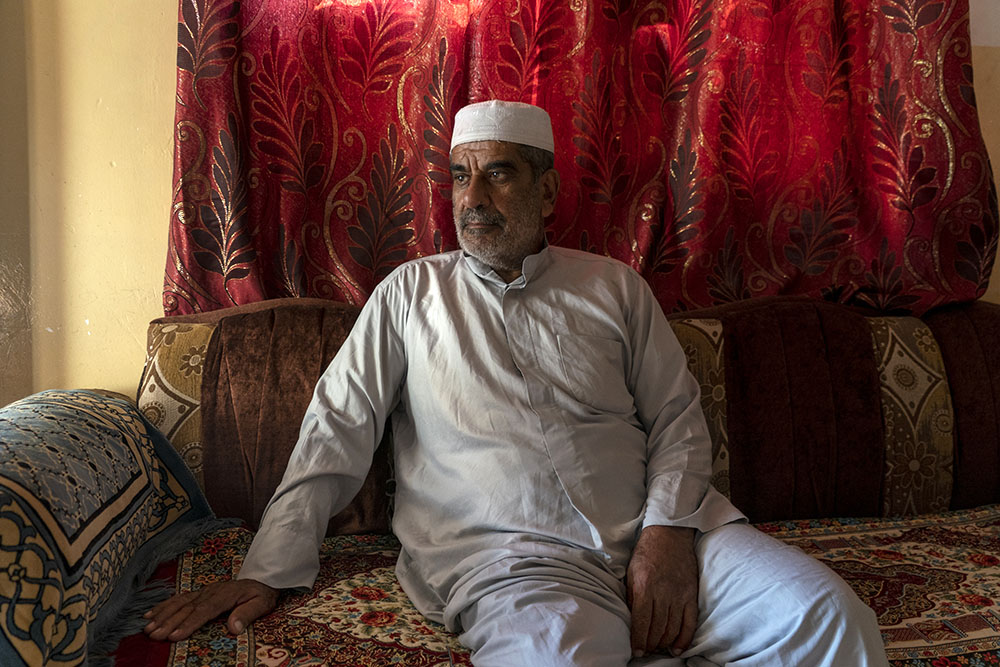
Abdullah Khalid, 66, has taught the Arabic language at Madrasat Al-Alam in Abu Khasib, east of Basra, for over 25 years. He is seeing the same issues in schools. Since 2018, he recounts, the pace of Iraqis who are climate-displaced has escalated rapidly, swelling class sizes from 25 to an unmanageable 85. “It’s as if the car can travel at 140 kilometers an hour and you’re asking it to do 300,” he says. “We can’t deliver education properly. I’ve seen the success of my students decline and the ability to write and read is deteriorating. It will have a dangerous effect in the long run.”
In their new lives in the cities, farmers struggle. After a lifetimes of working for themselves, earning a comfortable living, they now find themselves working low-paid, menial jobs, thrust into poverty and illegal housing. It is a huge rupture, an incalculable loss of income, culture, and morale. Psychologically, it is devastating.
Once a wealthy farmer from an important family in Al-Gatre, Sajjad Abu Karrar, 50, now tends a plot of land in the middle of a busy Basra roundabout. He lives nearby with his family in crammed windowless rooms that he gets in exchange for looking after the building next door. The $200 he earns a month is a pittance — and nowhere near enough for the family of seven. The struggle to survive on his meager salary aggravates the stress exerted by the profound loss of being forced by drought and water scarcity to abandon his family’s land. His marriage is showing signs of strain. Shorn of the important role women played on farms, Abu Karrar’s wife Nowali Khalilaf, 49, is depressed and isolated. With no community around her, no identity, unable to make ends meet on her husband’s salary and unable to contribute, she rarely ventures outside their house. Dejected, Abu Karrar watches as she leaves the room with her four-year-old granddaughter, Zahara, grasping her hand. “Of course, I miss more than my land,” he confides. “I miss my life, my history — my everything. I look at a picture. I miss my land, I miss when it was green, I miss my vegetables, my fruit … it makes me so sad.”
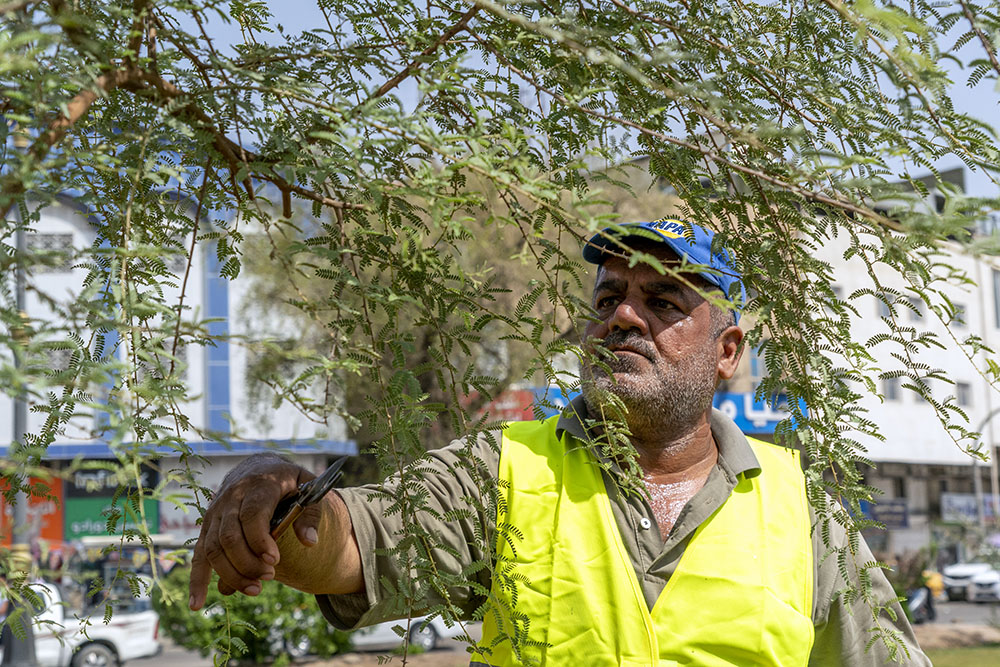
Abu Karrar and Khalilaf are not alone in their struggle to keep emotionally aloft. Depression and suicidal feelings were commonly voiced by the displaced farmers I spoke with, and on several occasions someone mentioned a friend who had actually committed suicide. Nabil Abboud, who left his farm and now works as a security guard at an oil facility while picking up whatever extra work he can find on the side to make ends meet, sums it up thus: “Maybe most of the farmers feel really bad and are thinking of suicide, but most don’t do it.”
Global warming is undoubtedly to blame for much of this. Temperatures have risen by at least 0.7°C over the past century, and extreme heat events are happening more frequently. Thirty years ago, explains Professor Shukri Al-Hassan, environmental expert at the University of Iraq, temperatures would reach 50°C on one or two summer days. Now, the temperature stays there for weeks on end.
Drought was also previously an infrequent event. But since the 1990s and early 2000s, drought waves have doubled six times, he explains. Rainfall used to average 160 millimeters per year. Now it is only 60–70 mm. The 2020–21 rainy season was the second driest in 40 years. The rising temperatures and infrequent rainfall and drought punctuated with an occasional flood have turned the environment into an adversary — for agriculture, humans, and animals alike.
Yet for many farmers who continued farming despite climate change, switching to crops more capable of surviving higher temperatures with less water, the kiss of death has been the dams in Turkey. Many say that 2019, the year the Ilisu Dam in Turkey was filled, was when life on farms started to become entirely impossible.
Turkey’s dams and hydroelectric facilities on the Tigris and Euphrates Rivers were already estimated to have reduced water in Iraq by 80 percent since 1975 – even before the Ilısu Dam, which sits on the Tigris River in southern Turkey, some 65 km north of the Iraqi border, was filled in 2019. Yet this dam further reduced the water discharge of the Tigris in Iraq from roughly 600 cubic meters (cu m) per second to around 300–20 cu m/second, according to Ramadan Hamza, a senior expert on water strategy and policy at the University of Dohuk. It is nothing short of catastrophic, dramatically compounding the impact of climate change. Even the 300–20 cu m/second is not a sure thing in the long run: the tap is controlled by Turkey.
Releasing 500 cu m/second, as Iraq has asked, would make the difference between survival and disaster. But Turkey isn’t releasing that amount, and with 22 more dams planned on the Tigris and Euphrates rivers as part of Ankara’s ambitious Southeastern Anatolia Dam Project, the problem is only going to get worse. Iraq is nearing a catastrophic point-of-no-return at which it runs out of useful water because what little remains becomes toxic, due to contamination by waste and sewage disposed of in rivers, as well as by skyrocketing salinity. With temperatures in Iraq expected to rise another two degrees by 2050 (highs above 120°F/50°C have been already recorded) and rainfall projected to decrease 9 percent within the same time frame, the impact of the demographic, economic, and workforce changes already disrupting society will become seismic in nature.
It would be wrong to see Iraq’s problems as distant and irrelevant. After all, climate-induced displacement is growing across the globe. With the phenomenon already compelling Iraqis to migrate in ever-increasing waves from one place to another within their country, or even to leave it altogether, Iraq is the canary in the coal mine.



